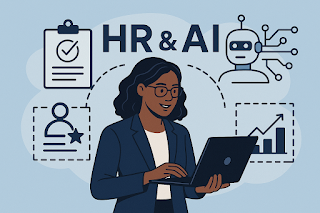AI and Performance Management - Unlocking Potential
Performance management is a critical process that helps organizations to monitor and evaluate employee performance. It involves setting goals, providing feedback, and conducting performance reviews. Traditionally, performance management has been a time-consuming and resource-intensive process for HR managers. However, the introduction of AI in HR management can help streamline and automate the process, saving time and improving accuracy.
Here are some ways AI can help HR management and organizations improve performance management:
Predictive analytics for performance assessment:
A survey by Deloitte found that 71% of companies consider people analytics a high priority in their organizations, and 34% are actively building people analytics capabilities. This indicates that more companies are recognizing the importance of using data to drive their HR decisions, including performance management.
One study by the University of Illinois found that using predictive analytics for performance assessment led to a 15% increase in productivity and a 20% reduction in turnover. This suggests that AI-powered performance management can have a significant positive impact on both employee performance and retention.
Automated performance evaluations:
According to a study by HR.com, 79% of HR professionals believe that automating HR tasks can save time and improve accuracy. This indicates that automating performance evaluations with AI can help to streamline the process and improve the accuracy of the data.
A report by the Society for Human Resource Management found that using AI for performance evaluations can help to reduce bias and increase fairness in the process. This is because AI can analyze data objectively, without being influenced by human biases.
Customized training and development plans:
A study by LinkedIn found that 94% of employees would stay at a company longer if it invested in their career development. By using AI to identify the specific training and development needs of individual employees, HR managers can help to improve employee satisfaction and retention.
Another study by the International Data Corporation found that companies that invest in employee training and development have 218% higher income per employee than companies that don't. This suggests that providing customized training and development plans with the help of AI can ultimately benefit the organisation's bottom line.
Talent retention and succession planning:
According to a survey by Glassdoor, 67% of job seekers said a diverse workforce is important when considering job offers. By using AI to identify and retain top talent, HR managers can help to create a more diverse and inclusive workforce, which can improve employee satisfaction and attract new talent.
Research by the Society for Human Resource Management found that replacing an employee can cost up to 200% of their annual salary. This indicates that investing in talent retention strategies, such as those that can be informed by AI, can ultimately save organizations significant amounts of money.
Objective decision-making:
A study by the Harvard Business Review found that people tend to be overconfident in their own abilities and judgments, and that this can lead to biases in decision-making. By using AI to analyze data objectively, HR managers can help to reduce these biases and make more informed decisions about performance management.
Research by McKinsey & Company found that companies that use data-driven decision-making are 6% more profitable than those that don't. This suggests that using AI to inform personnel decisions can have a positive impact on an organisation's bottom line.
In conclusion, these metrics and data support the potential benefits of using AI to improve performance management in HR management and organizations. By leveraging data to drive HR decisions, organizations can make more informed decisions that can lead to improved employee performance, retention, and overall business success.



Comments
Post a Comment